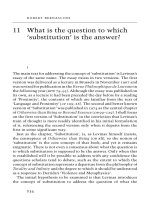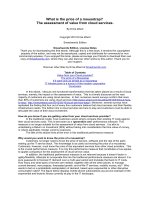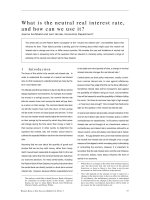What Is the THEA
Bạn đang xem bản rút gọn của tài liệu. Xem và tải ngay bản đầy đủ của tài liệu tại đây (71.44 KB, 6 trang )
T
he Texas Higher Education Assessment (THEA) was designed to ensure that students in Texas obtain
the reading, math, and writing skills necessary to take on college-level work. The test portion of the
program is administered and developed by the Texas Higher Education Coordinating Board (THECB)
and National Evaluation Systems, Inc. (NES). It was created to help educators identify students who may need
remedial help before pursuing higher-education courses.
Who Must Take the THEA?
All students who plan on enrolling in a Texas public institution of higher learning must take the THEA test.
Educational institutions decide what to do with students who do not pass portions of, or the entire test.
The THEA must also be passed by the following:
■
those who are entering a public higher education institution in Texas
■
those transferring from a private higher education institution in Texas
■
those transferring from an out-of-state higher education institution
■
those who are teacher education students in institutions in Texas
CHAPTER
What Is
the THEA?
CHAPTER SUMMARY
This chapter gives you the basic information you need to know about
the THEA: who has to take it, how to register, what is on the test, and
how it is scored.
1
1
You may not have to take the THEA if one of the
following is true of you:
■
you have an ACT composite score of 23, with a
minimum of 19 on both the English and Math
tests
■
you have an SAT combined Verbal and Math
score of 1070, with a minimum of 500 on both
the Verbal and Math tests (NOTE: The SAT is
changing in March 2005. These criteria may
change.)
■
you score 1770 on the Texas Assessment of
Academic Skills (TAAS) Writing test; score 89 on
the Texas Learning Index on the Reading test; and
score 86 on the Texas Learning Index on the
Math test
■
you enroll in a certificate program of 42 semester
credit hours or less at a public community college
or technical college
■
you have an associate’s or baccalaureate degree
NOTE: There are several other exemptions, and
institutions may have their own guidelines for exemp-
tion. You should understand whether these exemptions
apply to you before registering for the exam.
How Do I Register
for the THEA?
You may register for the THEA by mail or online.
(NOTE: You may only register by phone if you are reg-
istering late or are seeking emergency registration.) If
you are registering by mail, complete the form found in
the THEA Test Registration Bulletin. Your high school
guidance office or college admissions office will have
free copies of this bulletin. If you are registering online,
go to www.thea.nesinc.com. Once you have registered,
you will receive a registration receipt, and later an
admission ticket to the exam. You must bring your
admission ticket with you on exam day.
Registration Fee
There is a registration fee for the THEA test. At the time
this book was printed, this fee was $29. If you can’t
afford the fee and you think you might qualify for a
waiver, contact the financial aid office of the institution
you wish to attend or your high school guidance office
to see if it can be arranged.
2
THEA CAT
It is possible to take the THEA test on a computer. If you miss dates for the paper-and-pencil exam, this may
be a way for you to take the test on a different date; the Computer-Administered Test (CAT) is given more fre-
quently. The THEA CAT is administered once a week at 12 different locations in Texas. However, keep in mind
that seating is limited and the registration fee is higher than the fee for the paper-and-pencil test.
Important Contact Information
For questions as to whether you are exempt from tak-
ing the THEA test, about registration procedures, test
taking, score reports, or alternative dates and places,
contact your high school guidance office, college admis-
sions office, or one of the following:
Texas Higher Education Coordinating Board
www.thecb.state.tx.us
Division of Educational Partnerships
The Center for College Readiness
P.O. Box 12788
Austin, TX 78711-2788
512-427-6330
THEA Test
National Evaluation Systems, Inc.
www.thea.nesinc.com
P.O. Box 140347
Austin, TX 78714-0347
512-927-5397
When and Where
The THEA is administered six times throughout the
year. Typically, there is one test date in each of the fol-
lowing months: September, November, March, April,
June, and July. To find the test center closest to you,
check the THEA Test Registration Bulletin.
What Is the THEA Like?
You will have five hours to complete all three sections
on the THEA test; the three sections are not timed sep-
arately, which means you can take as much time as
you need for each section, but your total testing time
will not exceed five hours. Each section has from 40 to
50 multiple-choice questions; the Writing section also
has an essay. You do not have to complete every section
in one sitting. You may concentrate on one or two sec-
tions the first time you take the test, re-register, and
work solely on the third section at a later date. (How-
ever, keep in mind that you will have to pay the regis-
tration fee each time you take the test.)
What Is Tested
Three subjects—reading, math, and writing—will be
tested. All of the questions on the THEA will be in
multiple-choice format, with the exception of the essay-
writing portion. Each of the three sections of the test is
designed to test specific skills, which are listed below.
Reading
The first section of the THEA is the Reading section. It
is made up of 40 to 50 multiple-choice questions based
on approximately seven reading selections (300–700
words each). The questions on the Reading section of
the test are designed to test your ability to:
■
determine the meaning of words and phrases
■
understand the main idea and supporting details
in written material
■
identify an author’s purpose, point of view, and
intended meaning
■
analyze the relationship among ideas in written
material
■
use critical reasoning skills to evaluate written
material
■
apply the following study skills to reading assign-
ments: organizing and summarizing information;
understanding and following directions; and
interpreting graphs, tables, and charts
–
WHAT IS THE THEA?
–
3
Mathematics
The Math section of the THEA is also composed of
between 40 and 50 multiple-choice questions. The
types of math covered include fundamental mathe-
matics, algebra, geometry, and problem solving. Fol-
lowing are skills that are covered in each mathematical
discipline on the Math section of the THEA:
■
Fundamental Mathematics: Solving word prob-
lems with integers, fractions, decimals, and units
of measurement; solving problems involving vari-
ous types of graphs, tables, and charts; solving
problems involving mean, median, and mode;
and variability.
■
Algebra: Graphing numbers and the relationship
between numbers; solving equations and word
problems with one or two variables; understand-
ing operations involving algebraic expressions;
and solving problems involving quadratic equa-
tions.
■
Geometry: Solving problems involving geometric
figures; and solving problems involving geometric
concepts such as similarity, congruence, paral-
lelism, and perpendicularity.
■
Problem Solving: Using a combination of mathe-
matical and reasoning skills, including deductive
and inductive reasoning.
You will not need to memorize any complicated
formulas for the Math section; all appropriate formu-
las will be provided. Certain types of calculators are
permitted for the THEA.
Writing
The Writing section is made up of two subsections:
a multiple-choice subsection of between 40 and 50
questions, and a writing sample subsection where you
will demonstrate your ability to communicate your
thoughts in writing. The multiple-choice subsection
will test the following skills:
■
Elements of composition: Recognizing purpose
and audience; recognizing unity, focus, and devel-
opment in an essay; and recognizing effective
organization.
■
Sentence structure, usage, and mechanics: Recog-
nizing effective sentences; and recognizing edited
standard English.
The following qualities will be taken into consid-
eration when your essay is scored:
■
appropriateness
■
unity and focus
■
development
■
organization
■
sentence structure
■
usage
■
mechanical conventions
Test Day
On test day, you should plan to arrive around 30 min-
utes before the start of your test. You must bring your
admission ticket with you. If you are taking a paper-
based test, you should have several #2 pencils with you,
as well as an eraser. You are allowed to use a basic (non-
programmable) calculator on the THEA. Calculators
will not be provided to you, and you should check with
your testing center to be certain you have the correct
type of calculator.
–
WHAT IS THE THEA?
–
4
You will also need to have two forms of identifi-
cation. At least one form of identification must have a
recent photograph of you. Some approved forms of
identification include:
■
driver’s license
■
passport
■
military identification card
■
student identification card
What Not to Bring
Here are some items that will not be allowed in the test
room:
■
cell phones
■
pagers
■
unapproved calculators
■
watches with alarms
■
paper
■
study aids (dictionaries, books)
■
food or drink
■
backpacks or large bags
What about Scores?
After about two weeks from the day you take the THEA,
you should receive your scores. (If you take the THEA
CAT, you will receive unofficial scores immediately.
Later, you will receive official scores.) At the time you
register for the THEA test, you can request that your
scores be sent to one or more colleges or universities. If
you fail any portion of the THEA, the university or col-
lege you attend will require you to take remedial courses
in that subject until you are able to pass that section of
the THEA.
How the Test Is Scored
The multiple-choice sections of the exam will be scored
electronically. There is no penalty for guessing, so it is
in your best interest to fill in an answer, rather than
leaving a blank, even when you are unsure.
The writing sample is actually scored by human
beings, rather than by a computer. The scaled score for
the essay is from 1 to 4 points—4 being the highest.
Your essay will be read by two different people, so your
essay will receive a final score between 2 and 8. If you
score 6 or above, you automatically pass the entire
Writing section; your multiple-choice writing subsec-
tion is not even considered in the overall score. If you
score a 4 or below, you fail the entire Writing section,
regardless of your score on the multiple-choice sub-
section. If you score a 5 on the essay, then you must
answer 70% of the writing multiple-choice questions
correctly in order to pass the Writing section. In other
words, whether or not you pass the Writing section
depends most heavily on the quality of your essay, so
you should concentrate most of your study time on
learning to write a good essay.
Where Do I Begin?
You should begin your study program with Chapter 2,
“The LearningExpress Test Preparation System.” This
chapter will help you devise a study schedule for your-
self. If you stick to it, and devote yourself to improving
those areas in which you need help, you will be on
your way to passing the THEA.
–
WHAT IS THE THEA?
–
5









